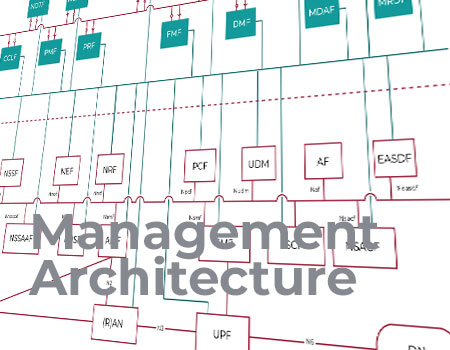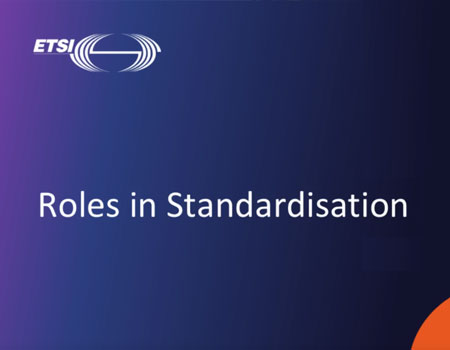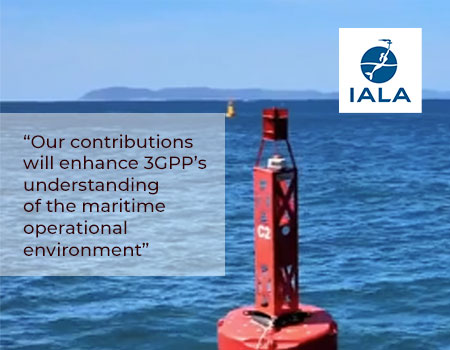By Hassan Al-Kanani (NEC, Rapporteur) & Yizhi Yao (Intel, Co-rapporteur)
First published June 2025, in Highlights Issue 10
The rapid integration of Artificial Intelligence and Machine Learning (AI/ML) into the 5G System has brought exciting possibilities for a wide range of enhancements, including intelligent automation and optimisation.
As AI/ML functionalities take shape within 5G networks, in addition to RAN groups and WG SA2 (Architecture), nearly all 3GPP working groups are advancing specification work to enable AI/ML-enhanced features in their respective domains. These parallel efforts reflect a growing emphasis on intelligent automation and data-driven operations across the entire system, highlighting the need for consistent and scalable AI/ML support - spanning all domains.
Within 3GPP, the SA5 working group plays a central role in ensuring that these capabilities can be managed, trusted and deployed reliably at scale. SA5’s work focuses on the domain-agnostic management and orchestration of AI/ML features, ensuring alignment and lifecycle support across the system.
WG SA5 is specifying how AI/ML functionalities can be managed efficiently and effectively, through a domain-independent AI/ML management and orchestration framework that supports the full lifecycle of AI/ML workflows—including model training, validation, testing, emulation, deployment, and inference execution.
While other working groups address AI/ML integration from their respective areas, SA5’s management centric approach ensures standardized coordination and lifecycle support across the 5G system. This includes RAN, Core Network, Management and Orchestration, and applications establishing a unified and extensible foundation for cross-domain AI/ML deployment.
Together, these aligned efforts provide a scalable platform for enabling intelligent network behaviour, reinforcing automation, adaptability, and intelligence in current and future 3GPP releases.
Rel-19 work: Expanding AI/ML management to support evolving enhancements in 5GS
The AIML Rel-18 specifications development project achieved significant milestones, including the development of a domain-agnostic AI/ML lifecycle management framework that covers all main phases (steps) of AI/ML operations in the 5GS. A Wide range of management capabilities, supported by detailed corresponding use cases, requirements and NRM-based APIs, were developed and documented in TS 28.105.
AI/ML LCM framework:
AI/ML LCM management capabilities:
| Lifecycle step | Capability name | Description |
| ML model training | Training management | Allows the MnS consumer to request, control, and monitor ML model training or re-training, including training performance management and policy setting |
| Validation management | Supports evaluation of model performance on validation data and identification of performance variance to determine if re-training is necessary. | |
| ML model testing | Testing management | Enables MnS consumer to request testing of a trained ML model, select performance metrics, receive results, and potentially trigger re-training based on outcomes. |
| AI/ML Inference emulation | Inference emulation | Provides capability to emulate ML inference for specific models in a test environment, enabling evaluation before actual deployment. |
| ML model deployment | Model loading management | Enables the MnS consumer to trigger, control, and monitor the loading of ML models into the appropriate functions. |
| AI/ML inference | Inference management | Allows the MnS consumer to activate/deactivate inference functions or models, configure output parameters, and monitor or update inference performance as needed. |
Building on the solid foundation established in Rel-18, the on-going work in Rel-19 further enhances the framework to provide consistent, scalable, and extensible support for AI/ML integration across the 5G System.
Overview of AI/ML management progress
Release 18 Accomplishments:
| Terminologies | -Developed a comprehensive set of terms relevant to AI/ML management. |
| Lifecycle Management Framework | -Defined a framework for managing the entire lifecycle of ML models and AI/ML inference functions, including; training, testing, emulation, deployment and inference. |
| Operational Capabilities | -Defined detailed AI/ML management capabilities across all lifecycle phases/steps. Supported by specific use cases, requirements and solutions. |
| Interfaces and APIs | -Specified stage 2 Network Resource Models (NRMs) and stage 3 (OpenAPIs) to support AI/ML management functionalities across the 5GS (management systems, 5GC and NG-RAN). |
| Functional Scenarios | -Documented scenarios describing potential locations and operational contexts for ML training and AI/ML inference functions within the 5G system. |
Release 19 Progression (Study completed, Normative work ongoing):
| Enhaned Management Capabilities | -For AI/ML across the 5GS (management system, 5GC, NG-RAN) – All are being assessed in the normative phase, building on the foundational work from Rel-18 with new use cases’ and corresponding requirements and solutions. |
| ML Model training enhancements |
-Support for knowledge-based transfer learning, distributed training, Federated Learning, Reinforcement Learning, pre-training and fine-tuning – All are under further evaluation during normative discussions. -Capabilities for monitoring training data statistics, model confidence and ensuring explainability are being explored for normative specification. -Energy-efficient training practices to enable sustainable AI/ML continue to be discussed as part of ongoing normative work. |
| AI/M Inference Emulation | -Inference emulation capabilities, including customer requested emulation and environment selection, are being further assessed for inclusion in normative specifications. |
| ML Model deployment | -Management aspects related to ML model loading, transfer /delivery and deployment in live networks are under active normative consideration. |
| AI/ML Inference |
-Mechanisms for improving coordination of AI/ML inference, latency optimization and remedial action are being refined as part of normative efforts. -Sustainable AI/ML practices for live network inference and model management are also under ongoing normative assessment. |
The ongoing AI/ML management project in SA5 strengthens the 5G System’s ability to support increasingly complex AI/ML-based functionalities being introduced across other domains such as those developed by SA2 and RAN work groups. Building on the lifecycle framework defined in Rel-18, the Rel-19 project enhances operational capabilities aligned with the following advanced techniques:
- Federated Learning (FL) and Vertical Federated Learning (VFL) techniques for decentralized and privacy-preserving training, supporting both Core and RAN use cases and capabilities.
- Reinforcement Learning (RL) and distributed training methods, enabling adaptive and scalable learning across diverse network environments.
- Sustainable AI/ML, incorporating energy-efficient mechanisms to ensure responsible and resource-aware model development.
- Flexible inference emulation and optimized model deployment for NG-RAN and 5GC, ensuring efficient coordination of AI/ML functionalities across live and test environments.
This forward-looking work ensures that the AI/ML management framework remains robust, flexible, and future proof, paving the way for intelligent automation and optimization in advanced 5G and beyond systems.
Rel-18: AI/ML functionalities and management scenarios
The key functional components involved in AI/ML deployment are the ML training function, which is responsible for training the model, and the inference function, which hosts the trained model to perform inference. These functionalities offer deployment flexibility and can be distributed across various domains in the 5GS to enable AI/ML capabilities effectively.
Figure: AI/ML functionality arrangement and deployment scenarios
The ML training and AI/ML inference functions may reside in different parts of the 5G system, depending on the deployment scenario, including:
- RAN or CN Management Systems,
- Network Functions (e.g., gNB, NWDAF),
- Cross-domain Management Systems.
The figure above highlights the various example scenarios of AI/ML functional arrangements.
References
- 3GPP Rel-18 TS 28.105; Management and orchestration; Artificial Intelligence/ Machine Learning (AI/ML) management.
- 3GPP Rel-19 TS 28.105; Management and orchestration; Artificial Intelligence/ Machine Learning (AI/ML) management.
- 3GPP Rel-18 TR 28.908; Study on Artificial Intelligence/Machine Learning (AI/ ML) management.
- 3GPP Rel-19 TR 28.858; Study on Artificial Intelligence / Machine Learning (AI/ML) management phase 2.
For more on WG SA5 see: www.3gpp.org/3gpp-groups


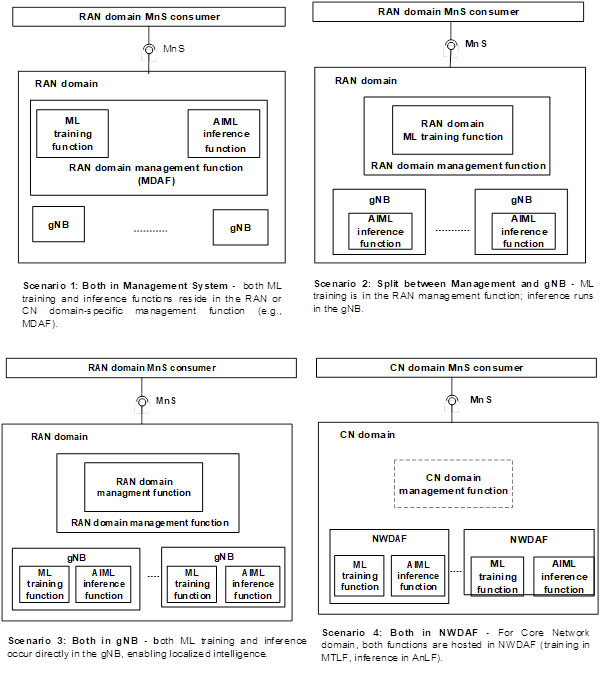
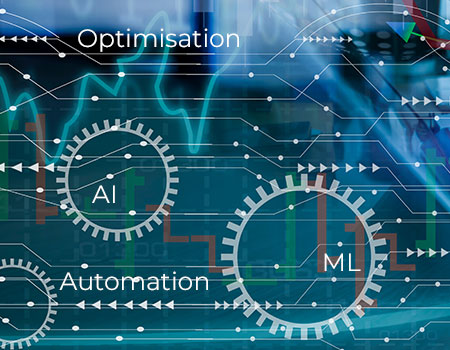
 Technology
Technology